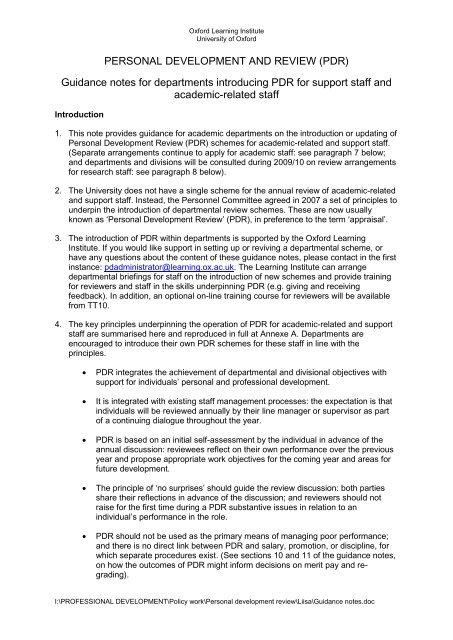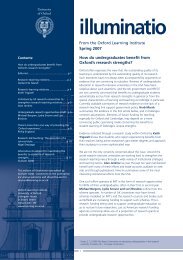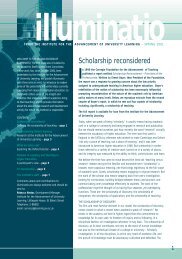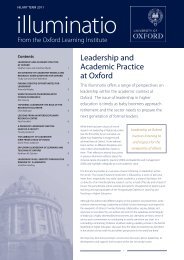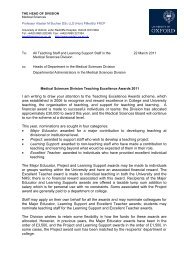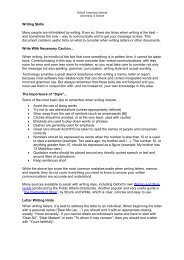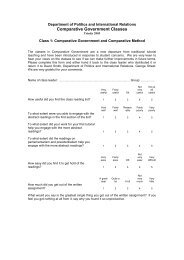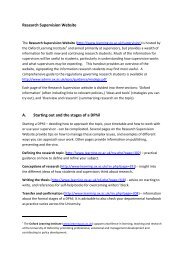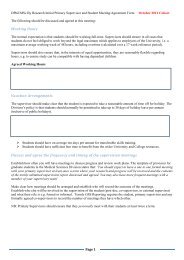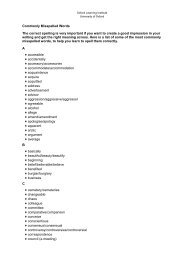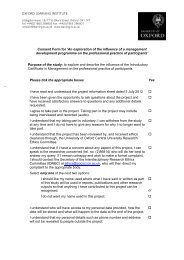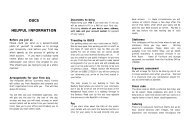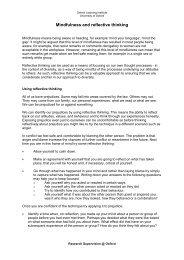Guidance notes for departments - Oxford Learning Institute ...
Guidance notes for departments - Oxford Learning Institute ...
Guidance notes for departments - Oxford Learning Institute ...
Create successful ePaper yourself
Turn your PDF publications into a flip-book with our unique Google optimized e-Paper software.
Ox<strong>for</strong>d <strong>Learning</strong> <strong>Institute</strong><br />
University of Ox<strong>for</strong>d<br />
PERSONAL DEVELOPMENT AND REVIEW (PDR)<br />
<strong>Guidance</strong> <strong>notes</strong> <strong>for</strong> <strong>departments</strong> introducing PDR <strong>for</strong> support staff and<br />
academic-related staff<br />
Introduction<br />
1. This note provides guidance <strong>for</strong> academic <strong>departments</strong> on the introduction or updating of<br />
Personal Development Review (PDR) schemes <strong>for</strong> academic-related and support staff.<br />
(Separate arrangements continue to apply <strong>for</strong> academic staff: see paragraph 7 below;<br />
and <strong>departments</strong> and divisions will be consulted during 2009/10 on review arrangements<br />
<strong>for</strong> research staff: see paragraph 8 below).<br />
2. The University does not have a single scheme <strong>for</strong> the annual review of academic-related<br />
and support staff. Instead, the Personnel Committee agreed in 2007 a set of principles to<br />
underpin the introduction of departmental review schemes. These are now usually<br />
known as „Personal Development Review‟ (PDR), in preference to the term „appraisal‟.<br />
3. The introduction of PDR within <strong>departments</strong> is supported by the Ox<strong>for</strong>d <strong>Learning</strong><br />
<strong>Institute</strong>. If you would like support in setting up or reviving a departmental scheme, or<br />
have any questions about the content of these guidance <strong>notes</strong>, please contact in the first<br />
instance: pdadministrator@learning.ox.ac.uk. The <strong>Learning</strong> <strong>Institute</strong> can arrange<br />
departmental briefings <strong>for</strong> staff on the introduction of new schemes and provide training<br />
<strong>for</strong> reviewers and staff in the skills underpinning PDR (e.g. giving and receiving<br />
feedback). In addition, an optional on-line training course <strong>for</strong> reviewers will be available<br />
from TT10.<br />
4. The key principles underpinning the operation of PDR <strong>for</strong> academic-related and support<br />
staff are summarised here and reproduced in full at Annexe A. Departments are<br />
encouraged to introduce their own PDR schemes <strong>for</strong> these staff in line with the<br />
principles.<br />
<br />
<br />
<br />
<br />
<br />
PDR integrates the achievement of departmental and divisional objectives with<br />
support <strong>for</strong> individuals‟ personal and professional development.<br />
It is integrated with existing staff management processes: the expectation is that<br />
individuals will be reviewed annually by their line manager or supervisor as part<br />
of a continuing dialogue throughout the year.<br />
PDR is based on an initial self-assessment by the individual in advance of the<br />
annual discussion: reviewees reflect on their own per<strong>for</strong>mance over the previous<br />
year and propose appropriate work objectives <strong>for</strong> the coming year and areas <strong>for</strong><br />
future development.<br />
The principle of „no surprises‟ should guide the review discussion: both parties<br />
share their reflections in advance of the discussion; and reviewers should not<br />
raise <strong>for</strong> the first time during a PDR substantive issues in relation to an<br />
individual‟s per<strong>for</strong>mance in the role.<br />
PDR should not be used as the primary means of managing poor per<strong>for</strong>mance;<br />
and there is no direct link between PDR and salary, promotion, or discipline, <strong>for</strong><br />
which separate procedures exist. (See sections 10 and 11 of the guidance <strong>notes</strong>,<br />
on how the outcomes of PDR might in<strong>for</strong>m decisions on merit pay and regrading).<br />
I:\PROFESSIONAL DEVELOPMENT\Policy work\Personal development review\Liisa\<strong>Guidance</strong> <strong>notes</strong>.doc
Ox<strong>for</strong>d <strong>Learning</strong> <strong>Institute</strong><br />
University of Ox<strong>for</strong>d<br />
5. Standard templates are available to support <strong>departments</strong> in introducing or updating PDR<br />
schemes: these can be adapted as necessary to suit the local context and culture, in<br />
consultation with staff. Sample templates are given at Annexe B. These reflect the<br />
experience and practices of those <strong>departments</strong> across the University who have<br />
introduced PDR schemes since 2007.<br />
6. Staff in the University Administration and Services are covered by a single scheme,<br />
though there are some local variants on this. For details, see:<br />
http://www.admin.ox.ac.uk/personneluas/staffdev/index.shtml#_Toc192402455<br />
7. Staff in Library Services, Computing Services and some other ASUC <strong>departments</strong> are<br />
also reviewed under separate schemes which reflect the University‟s general principles.<br />
For details contact your local HR manager or personnel administrator.<br />
8. Academic staff continue to be appraised under the University‟s existing scheme which<br />
provides <strong>for</strong> a discussion once every five years. For further guidance, see:<br />
http://www.admin.ox.ac.uk/ps/staff/academic/appraisal/guidance.shtml<br />
9. During 2009/10, <strong>departments</strong> and divisions will be consulted on review arrangements <strong>for</strong><br />
research staff, in line with the University‟s revised Code of Practice <strong>for</strong> the Employment<br />
and Career Development of Research Staff. The Code envisages that research staff will<br />
be included in departmental PDR arrangements and, pending the outcome of the<br />
consultation, existing departmental schemes should be open to those members of<br />
research staff who seek an annual review meeting.<br />
2
Ox<strong>for</strong>d <strong>Learning</strong> <strong>Institute</strong><br />
University of Ox<strong>for</strong>d<br />
Introducing departmental PDR schemes <strong>for</strong> academic-related and<br />
support staff<br />
Checklist of questions<br />
Departments are invited to consider the following questions be<strong>for</strong>e introducing or updating<br />
PDR schemes.<br />
What local arrangements will there be <strong>for</strong> consultation with the staff concerned<br />
1. The principles agreed by the Personnel Committee require <strong>departments</strong> to make<br />
appropriate arrangements <strong>for</strong> local consultation on the development of PDR. That<br />
consultation is expected to cover:<br />
<br />
<br />
<br />
<br />
how PDR will be integrated with existing staff management processes in the<br />
department<br />
how the record of the discussion will be agreed between reviewer and reviewee<br />
how agreed training and development needs arising from PDR will be collated<br />
and acted on<br />
how other individual or collective actions identified through PDR will be reviewed.<br />
2. Experience across the University has shown that PDR is likely to be most effective, and<br />
to be more readily accepted by staff, where staff are consulted in the early stages of<br />
designing and developing a new scheme:<br />
<br />
<br />
Some <strong>departments</strong> have set up a working group of representatives of each of the<br />
categories of staff who will be covered by a scheme, to consider what<br />
departmental purposes and objectives the scheme can support and what<br />
arrangements need to be made locally <strong>for</strong> the processes outlined above.<br />
Other <strong>departments</strong> have adopted a two-stage approach to the introduction of<br />
PDR. In the first stage, a basic outline of the scheme and its associated<br />
paperwork has been presented to those who will be reviewers under the scheme<br />
(sometimes following input from an advisory group). The scheme has then been<br />
adapted in the light of comments from reviewers, be<strong>for</strong>e a final version is<br />
circulated to all staff.<br />
How will the department ‘own’ the scheme<br />
3. PDR is also likely to be more effective if it is seen by staff to be „owned‟ by the<br />
department and to have the support of the Head of Department:<br />
<br />
<br />
<br />
Could the Head of Department write a preface to the scheme, showing how it<br />
supports departmental aims or objectives<br />
Could the Head introduce or attend any briefings arranged to launch the<br />
scheme<br />
Does the scheme paperwork incorporate the department‟s name and logo and<br />
reflect its usual house style<br />
3
Ox<strong>for</strong>d <strong>Learning</strong> <strong>Institute</strong><br />
University of Ox<strong>for</strong>d<br />
When will PDR discussions be held<br />
4. The expectation is that PDR discussions are held annually. Departments are free to<br />
decide at which point in the year to schedule discussions:<br />
<br />
<br />
Some <strong>departments</strong> conduct PDRs at the same time each year, often during<br />
Trinity Term/the Long Vacation (this means the outcome of the discussions can<br />
be used, with the consent of the individual, as one piece of evidence to in<strong>for</strong>m<br />
merit review: see paragraph 10, below). Other <strong>departments</strong> hold PDRs<br />
immediately after the merit round, during Michaelmas Term. Holding all<br />
discussions at the same time simplifies the administration and monitoring of PDR<br />
and makes it easier to integrate the process with departmental planning and act<br />
on any outcomes of PDR at departmental level.<br />
Other <strong>departments</strong> hold PDRs on the anniversary of an individual‟s appointment<br />
to a post, so that discussions are scheduled throughout the year. This spreads<br />
the load <strong>for</strong> reviewers and rein<strong>for</strong>ces the focus on the individual, but makes it<br />
harder to link PDR with other departmental processes, and more difficult to<br />
collate and act on training and development or other needs at the level of the<br />
department. It also makes the administration and monitoring of the scheme more<br />
complex.<br />
How will the scheme be integrated with departmental planning processes<br />
5. PDR is intended to integrate planning to meet departmental and University objectives<br />
with review of individuals‟ per<strong>for</strong>mance and consideration of the support needed to<br />
achieve future objectives. It integrates a review of objectives set the previous year and<br />
the setting of new objectives <strong>for</strong> the coming year with an opportunity to discuss<br />
individuals‟ development in and beyond the role.<br />
6. Whenever PDR discussions are held within your own department, it is helpful <strong>for</strong> the<br />
departmental objectives <strong>for</strong> the next year to be agreed and circulated in advance of<br />
PDRs, so that individuals can take account of higher-level objectives in proposing their<br />
own goals <strong>for</strong> the coming year; and the department objectives can in turn in<strong>for</strong>m the PDR<br />
discussion.<br />
How will PDR be integrated with existing staff management processes<br />
7. The expectation is that individuals will be reviewed by their line manager or supervisor as<br />
part of a continuing dialogue throughout the year. Be<strong>for</strong>e PDR is introduced,<br />
<strong>departments</strong> will need to consider the following questions:<br />
<br />
<br />
<br />
Does each individual in the Department know who their manager/supervisor is <strong>for</strong><br />
the purposes of PDR, and <strong>for</strong> continuing support throughout the year<br />
Are all managers and supervisors clear about their responsibilities <strong>for</strong> managing<br />
staff, and the role of PDR in relation to those responsibilities (The PDR<br />
handbook <strong>for</strong> reviewers of academic-related and support staff provides further<br />
guidance).<br />
Does each individual have an up-to-date job description In the first year of<br />
operation of a scheme, reviewees may not have detailed objectives covering<br />
each area of their work, and they may not have had the opportunity <strong>for</strong> some time<br />
to review their job description: the current job description provides a useful<br />
starting point <strong>for</strong> the discussion.<br />
4
Ox<strong>for</strong>d <strong>Learning</strong> <strong>Institute</strong><br />
University of Ox<strong>for</strong>d<br />
8. There are some exceptions to the principle of individuals being reviewed by their line<br />
manager:<br />
<br />
<br />
Where an individual has more than one manager, or has day-to-day tasks mostly<br />
allocated by a project manager separate from his/her line manager, you will need<br />
to reach agreement on who should conduct the review. The discussion itself<br />
should not usually be conducted by more than one reviewer but the reviewer may<br />
seek feedback from the other manager in advance of the discussion, with the<br />
agreement of the reviewee.<br />
In the rare cases where there is a breakdown in the line manager relationship,<br />
how will the scheme provide <strong>for</strong> individuals to have an alternative reviewer<br />
9. PDR should not be used as the primary means of managing poor per<strong>for</strong>mance; and<br />
there is no direct link between PDR and salary, promotion, or discipline, <strong>for</strong> which<br />
separate procedures exist. For further details on the role of PDR in managing<br />
per<strong>for</strong>mance, see the PDR handbook.<br />
10. As outlined above, PDR is conducted separately from, and at a different time to,<br />
consideration of merit pay. However, if the review of the past year indicates that<br />
per<strong>for</strong>mance has been exceptional, in<strong>for</strong>mation from the PDR can be used, with the<br />
consent of the individual, to in<strong>for</strong>m further consideration under any arrangements <strong>for</strong><br />
merit review.<br />
11. Similarly, a PDR discussion should not be used primarily to discuss re-grading of a post.<br />
However, if it is clear from the discussion that the role has changed significantly during<br />
the year, or is likely to change significantly, submitting a post <strong>for</strong> re-grading might be one<br />
of the agreed outcomes of the discussion.<br />
How will individuals prepare <strong>for</strong> the discussion<br />
12. The individual begins the PDR process by reflecting on their own per<strong>for</strong>mance over the<br />
previous year and proposing appropriate work objectives <strong>for</strong> the coming year and areas<br />
<strong>for</strong> future development. These reflections are then shared with the reviewer in advance<br />
of the discussion and reviewers flag up at this stage any additional topics they want to<br />
cover during the discussion. How will you structure this advance preparation – through a<br />
standard template or a list of reflective questions emailed in advance to the reviewee.<br />
Should the scheme incorporate feedback<br />
13. Seeking feedback is an optional part of PDR; and you will need to consider whether and<br />
how you want to incorporate feedback in your scheme. The aim of eliciting feedback<br />
from others is to secure a more rounded view of the individual‟s work over the previous<br />
year, and to hear a broader spread of ideas on how certain aspects of the job might be<br />
done differently. The feedback can come from colleagues within the department or<br />
others, within the University or externally, with whom the individual works closely or <strong>for</strong><br />
whom they provide a service. You can use a short <strong>for</strong>m to elicit feedback, or an email.<br />
Reviewers will need to agree with the individuals they manage who it would be<br />
appropriate to contact; and what <strong>for</strong>m the feedback should take: e.g. should comments<br />
be sent directly to the individual and the reviewer, or should they be sent only to the<br />
reviewer<br />
5
Ox<strong>for</strong>d <strong>Learning</strong> <strong>Institute</strong><br />
University of Ox<strong>for</strong>d<br />
How will you safeguard and act on records of the discussion<br />
14. Departments need to consult locally on what arrangements should be made to record<br />
PDR discussions and to store PDR records safely. You will also need to consider<br />
whether you wish anyone other than the reviewer and reviewee to see the agreed record<br />
of the meeting. Some <strong>departments</strong> have a procedure called „grand-parenting‟, whereby<br />
the agreed record is also seen by the reviewer‟s line manager, or by the Head of<br />
Department.<br />
15. Most <strong>departments</strong> use a template to record the discussion (see Annexe B) which can be<br />
completed by either reviewer or reviewee. The aim is to reach consensus on an agreed<br />
record of the meeting but, if this is not possible, it is preferable to record significant areas<br />
of disagreement in a way that both parties are happy with, rather than spend<br />
considerable time trying to reach agreement. The completed <strong>for</strong>m needs to be signed by<br />
both reviewer and reviewee.<br />
How will you share and act on agreed training and development needs, or other needs that<br />
require action at the level of the department<br />
16. Introducing a PDR scheme can raise individual expectations about the support that staff<br />
will receive in the role. Be<strong>for</strong>e introducing a scheme, you will need to consider what<br />
support is available to individuals; and how you will record, collate and act on the needs<br />
identified through PDR:<br />
<br />
<br />
<br />
<br />
<br />
How will you record individual‟s agreed training and development needs Most<br />
<strong>departments</strong> have a separate <strong>for</strong>m, or part of the <strong>for</strong>m, which records any agreed<br />
needs and which both parties agree to share on a selective basis with others<br />
(e.g. the departmental administrator or Management Group)<br />
What arrangements can be made locally (within the department or cognate<br />
<strong>departments</strong>, within a building or across the division) to provide development<br />
opportunities <strong>for</strong> staff (e.g. through local mentoring, work-shadowing or<br />
secondment arrangements)<br />
Are all staff and reviewers aware of the University‟s central training and<br />
development provision See:<br />
http://www.ox.ac.uk/sg/working_at_ox<strong>for</strong>d/training_development/index.html<br />
What percentage of the department‟s budget can be set aside to cover any<br />
training and development needs arising from PDR that are not covered by the<br />
University‟s central provision How will the department collate and act on these<br />
needs<br />
How will the department identify any collective needs arising from PDR (e.g. the<br />
PDR process might indicate a shared need <strong>for</strong> support in a particular software<br />
package or set of skills, that is best met at the level of the department, rather than<br />
by individual participation in courses).<br />
How will the actions arising from PDR be followed up throughout the year<br />
17. Although PDR is an annual process, the expectation is that it will be integrated with dayto-day<br />
management processes. Some <strong>departments</strong> include explicit provision <strong>for</strong> review<br />
of the outcomes of PDR, at three-monthly, or six-monthly intervals. Others make less<br />
<strong>for</strong>mal provision <strong>for</strong> the actions arising from PDR to be reviewed during regular one-toone<br />
meetings between reviewers and individuals.<br />
6
Ox<strong>for</strong>d <strong>Learning</strong> <strong>Institute</strong><br />
University of Ox<strong>for</strong>d<br />
Annexe A: Principles <strong>for</strong> the introduction of personal development review<br />
<strong>for</strong> university support and academic-related staff<br />
These principles were agreed by the University‟s Personnel Committee in Michaelmas 2007.<br />
1. All <strong>departments</strong> will have in place a scheme <strong>for</strong> personal and career development<br />
review that aims to integrate support <strong>for</strong> individuals with the achievement of<br />
departmental objectives. Departments will be expected to make appropriate<br />
arrangements <strong>for</strong> consultation at the local level on the development of such<br />
schemes.<br />
2. All academic-related and support staff within a department will normally be expected<br />
to participate in the departmental scheme. There will be a further central consultation<br />
on the introduction of appropriate arrangements <strong>for</strong> academic staff, based on these<br />
principles.<br />
3. The scheme will be based on an annual discussion that is integrated with existing<br />
staff management processes and is part of a continuing dialogue between individuals<br />
and their line manager or supervisor.<br />
4. All schemes will adopt the minimum of paperwork that is consistent with safe recordkeeping<br />
and good staff management practice. The <strong>Learning</strong> <strong>Institute</strong> will provide<br />
central templates <strong>for</strong> the processes and paper-work associated with the scheme, that<br />
<strong>departments</strong> can adopt locally.<br />
5. There will be no direct link between the review process and probation, salary,<br />
promotion, or discipline, <strong>for</strong> which separate procedures exist. If, however, the review<br />
indicates that per<strong>for</strong>mance has been exceptional, or that the job has grown<br />
significantly, in<strong>for</strong>mation from the discussion can be used with the consent of the<br />
individual to in<strong>for</strong>m the separate procedures <strong>for</strong> merit reviews or re-grading. The<br />
<strong>Learning</strong> <strong>Institute</strong> and Personnel Services will provide guidance to <strong>departments</strong>, and<br />
training <strong>for</strong> departmental administrators, on how to coordinate Personal Development<br />
Review with other local staff management processes.<br />
6. The <strong>Learning</strong> <strong>Institute</strong> and Personnel Services will consider how local schemes can<br />
best be monitored with a light touch, to ensure consistency of treatment between<br />
individual members of staff.<br />
7. Schemes will incorporate an element of self-evaluation. Individuals will be<br />
responsible <strong>for</strong> an initial assessment of their own per<strong>for</strong>mance against agreed<br />
objectives and <strong>for</strong> suggesting any areas <strong>for</strong> future development, including<br />
opportunities to pursue life-long learning. Appropriate feedback on per<strong>for</strong>mance will<br />
be provided by the individual‟s agreed reviewer. This will usually be their line<br />
manager or supervisor.<br />
8. It is expected that all schemes will be based on the following framework, and that<br />
<strong>departments</strong> will make only minor adjustments to this framework where this is<br />
necessary to tailor it to the local context.<br />
a) Individuals will prepare <strong>for</strong> the annual review discussion by reflecting on their<br />
progress against agreed objectives/core areas of work <strong>for</strong> the previous year;<br />
considering whether their job description accurately reflects the requirements<br />
of the role; proposing draft objectives <strong>for</strong> the <strong>for</strong>thcoming year; and<br />
suggesting any associated training and development needs. It is recognized<br />
that not all members of support staff will have individual objectives specific to<br />
their role.<br />
b) Individuals, and their line managers/supervisors, will share their reflections on<br />
these issues in advance of the discussion (either in writing or orally), to<br />
enable both parties to reflect on the issues raised and to prepare adequately<br />
<strong>for</strong> the discussion.<br />
c) The annual discussion will cover:<br />
7
Ox<strong>for</strong>d <strong>Learning</strong> <strong>Institute</strong><br />
University of Ox<strong>for</strong>d<br />
<br />
<br />
<br />
<br />
<br />
<br />
<br />
a review of progress towards the individual‟s objectives <strong>for</strong> the previous year<br />
[or, in the first year of operation of the scheme, or where individual objectives<br />
are not appropriate, a review of key activities undertaken]<br />
a review of the core areas of the individual‟s current role and responsibilities<br />
and how these are being interpreted<br />
discussion of successes in achieving objectives, or undertaking activities,<br />
over the past year<br />
the identification of any barriers to the achievement of objectives or activities<br />
and possible remedies<br />
agreement of appropriate objectives or activities <strong>for</strong> the following year, linked<br />
as relevant to departmental plans and the University‟s Corporate Plan<br />
consideration of the individual‟s immediate development needs, including<br />
training, and other support requirements; and the effectiveness of any training<br />
or development carried out over the previous review period<br />
with the agreement of the individual, discussion of longer-term career<br />
development, including any support required and any opportunities <strong>for</strong> lifelong<br />
learning.<br />
9. Departments will make locally appropriate arrangements, based on guidance and<br />
templates provided by the <strong>Learning</strong> <strong>Institute</strong>, <strong>for</strong>:<br />
a) individuals and their reviewers to agree a record of the discussion, with a<br />
presumption that the record will be held on the individual‟s personal file<br />
b) collating and acting on agreed training and development needs arising from<br />
the annual review discussions, including mechanisms to ensure that common<br />
themes and training needs emerging from review discussions are picked up<br />
and acted on<br />
c) regular review of other individual or collective actions identified by the annual<br />
review process; and <strong>for</strong> integration of the review process with existing staff<br />
management procedures.<br />
8
Ox<strong>for</strong>d <strong>Learning</strong> <strong>Institute</strong><br />
University of Ox<strong>for</strong>d<br />
Annexe B Suggested templates to support the introduction of PDR <strong>for</strong><br />
academic-related and support staff.<br />
1. Most departmental PDR schemes are supported by two standard <strong>for</strong>ms:<br />
<br />
<br />
A „Form A‟ or equivalent, which both reviewees and reviewers use to prepare in<br />
advance <strong>for</strong> the PDR discussion<br />
A „Form B‟ or equivalent, which is used to record the discussion.<br />
2. Some <strong>departments</strong> then use a separate section of Form B to record agreed training<br />
and development needs, other <strong>departments</strong> use a separate <strong>for</strong>m (Form C).<br />
3. We reproduce in this annexe the paperwork in use within one academic department,<br />
that was developed in consultation with staff<br />
Personal Development and Review Scheme <strong>for</strong> Support Staff<br />
Introduction by Head of Department<br />
The [Department] is introducing a new “Personal Development and Review Scheme” (PDR).<br />
The scheme is being introduced <strong>for</strong> support and academic-related (admin) staff in the first<br />
instance and will apply to all such staff whether on fixed-term, permanent or open-ended<br />
contracts. The University‟s scheme <strong>for</strong> appraisal of academic staff will remain unchanged.<br />
I believe that the scheme will bring considerable benefits to individual staff. Participating in<br />
an annual PDR discussion will enable you to review the progress you have made over the<br />
last year, to discuss what additional support you might need to undertake your work over the<br />
coming year, and, where appropriate, what your further career plans are, and what support<br />
might be available from the department or the central university to help you fulfil those plans.<br />
The new scheme will also enable you, where appropriate, to discuss and agree with your<br />
line manager your <strong>for</strong>thcoming objectives and to understand how those objectives fit with the<br />
Department‟s strategies <strong>for</strong> retaining its position of excellence in research and teaching.<br />
Brief Description of the Scheme<br />
1. The intention is that the new PDR scheme will build on existing staff management<br />
processes, such as one-to-one discussions and team meetings and will <strong>for</strong>m part of a<br />
continuing dialogue between individuals and their line manger.<br />
2. The scheme will integrate support <strong>for</strong> individuals with the achievement of the objectives<br />
of the Department and the Division.<br />
3. The scheme will apply to support and academic-related (admin) staff in the Department<br />
once they have completed their probationary period.<br />
4. The scheme will be based on a confidential annual review discussion normally<br />
conducted by an individual‟s line manager. Within the Department, many members of the<br />
support staff have an operational as well as a line manager and in some cases it may be<br />
more appropriate <strong>for</strong> the operational manager to conduct the review with input from the<br />
line manager. If the line manager does conduct the review they will ask <strong>for</strong> input from the<br />
operational manager. In exceptional circumstances, individuals will have the option of<br />
seeking another reviewer.<br />
5. There is no direct link between the scheme and salary, promotion, or discipline, <strong>for</strong> which<br />
there are separate departmental procedures. If, however, an annual review indicates<br />
that per<strong>for</strong>mance has been exceptional, or that the job has grown significantly,<br />
9
Ox<strong>for</strong>d <strong>Learning</strong> <strong>Institute</strong><br />
University of Ox<strong>for</strong>d<br />
in<strong>for</strong>mation from the discussion can be used, with the consent of the individual, to in<strong>for</strong>m<br />
the separate departmental procedures <strong>for</strong> merit reviews or re-grading.<br />
6. The review discussion will include a review of the individual‟s per<strong>for</strong>mance over the past<br />
year, agreement on appropriate objectives/tasks <strong>for</strong> the <strong>for</strong>thcoming year; discussion of<br />
any support needed to achieve those objectives (including training and development);<br />
and discussion of future career plans where appropriate.<br />
7. The process, apart from passing on in<strong>for</strong>mation about training needs and other points<br />
requiring action by the department, will be confidential between the reviewer and<br />
reviewee.<br />
8. All participants in the scheme, including reviewers, will be expected to take part in a<br />
short training session organised by the Ox<strong>for</strong>d <strong>Learning</strong> <strong>Institute</strong>.<br />
9. All participants will be expected to maintain the confidentiality of the process.<br />
The Process in Outline<br />
Once established the PDRs will be conducted on an annual cycle which will be completed by<br />
the end of June each year so the discussions can in<strong>for</strong>m the Merit Review process (see 5<br />
above).<br />
a) Your line manager (or other agreed reviewer) will contact you to say that the review cycle<br />
is underway and to arrange with you a suitable date <strong>for</strong> the meeting which should be at<br />
least six weeks away.<br />
b) You should prepare <strong>for</strong> the annual review discussion by completing Section A of the<br />
“prompt sheet” (Annex A). This prompt sheet will be available on-line at [xxx]<br />
c) In completing the prompt sheet, you are invited to reflect on:<br />
the main duties or activities you have undertaken over the previous year and on any<br />
changes to those duties;<br />
your main achievements in fulfilling those duties, including, after the first year, the<br />
extent to which you have met any agreed objectives, and any difficulties or obstacles<br />
you may have encountered;<br />
how your duties, activities and achievements reflect what was anticipated at the start<br />
of the period;<br />
your proposed aims and objectives <strong>for</strong> the next year and any suggestions <strong>for</strong><br />
improvements or changes to the way you work;<br />
any additional support you may need, including training or development.<br />
Where appropriate, you may also want to outline your future career plans and any ideas<br />
<strong>for</strong> support that the Department or University might provide to you in achieving those<br />
plans.<br />
d) Send your completed prompt sheet to your line manager (or other agreed reviewer) at<br />
least two weeks be<strong>for</strong>e the date of the review meeting.<br />
e) You and your reviewer should agree a venue <strong>for</strong> the review meeting where you feel<br />
com<strong>for</strong>table and where the discussion can take place in confidence. The meeting will<br />
generally last around an hour.<br />
f) Your reviewer will then lead the discussion based on the prompt sheet. He or she should<br />
invite you first to give your own reflections; and then give you his or her feedback.<br />
g) Following your meeting your reviewer will draft a short note of the discussion <strong>for</strong> Section<br />
B of the <strong>for</strong>m and seek your comments on this draft. The note should make clear any<br />
action points and who is responsible <strong>for</strong> following them up.<br />
h) Any training or development needs or other points requiring action by the department<br />
should be entered in Section C of the <strong>for</strong>m. It should be noted that this part of the <strong>for</strong>m<br />
will be seen by the [Departmental Administrator] and completion of it is voluntary.<br />
i) Once the record has been agreed and all the sections have been signed the reviewer<br />
should:<br />
10
Ox<strong>for</strong>d <strong>Learning</strong> <strong>Institute</strong><br />
University of Ox<strong>for</strong>d<br />
<br />
<br />
<br />
Send a copy of Section C of the <strong>for</strong>m to [the Departmental Administrator]<br />
Give a copy of the <strong>for</strong>m to the reviewee<br />
File the original in a secure cabinet<br />
If a line manager leaves the Department, the material relating to the reviews <strong>for</strong> their<br />
team will normally be passed on to their successor with the consent of the individual<br />
concerned.<br />
In subsequent years the record of the previous year‟s meeting will in<strong>for</strong>m completion of<br />
the prompt sheet by the reviewee.<br />
11
Ox<strong>for</strong>d <strong>Learning</strong> <strong>Institute</strong><br />
University of Ox<strong>for</strong>d<br />
CONFIDENTIAL<br />
Personal Development and Review Scheme <strong>for</strong> Support and Academic-Related<br />
(Admin) Staff<br />
Prompts <strong>for</strong> Review<br />
SECTION A: To be completed by the reviewee be<strong>for</strong>e the review discussion<br />
NAME …………………………………………………………………………….<br />
REVIEWER ………………………………………………………………………<br />
Please complete this prompt sheet and send it to your line manager or agreed<br />
reviewer at least two weeks be<strong>for</strong>e the date that has been arranged <strong>for</strong> your review<br />
1. Main duties/activities in preceding twelve-month period<br />
2. Major changes in duties/activities<br />
3. Achievements including the extent to which you have met any objectives set in the<br />
previous year.<br />
4. Exploration of whether the duties, activities and achievements reflected what was<br />
anticipated at the start of the period<br />
5. Difficulties/obstacles encountered<br />
6. Objectives/aims <strong>for</strong> the future<br />
12
Ox<strong>for</strong>d <strong>Learning</strong> <strong>Institute</strong><br />
University of Ox<strong>for</strong>d<br />
7. Suggestions <strong>for</strong> improvements/changes<br />
8. Support needed to help you achieve your future aims/objectives, including any<br />
training and development needs<br />
9. Career development plans and support needed to achieve these plans<br />
13
Ox<strong>for</strong>d <strong>Learning</strong> <strong>Institute</strong><br />
University of Ox<strong>for</strong>d<br />
CONFIDENTIAL<br />
Personal Development and Review Scheme <strong>for</strong> Support Staff<br />
SECTION B – To be completed by the reviewer after the review discussion<br />
NAME …………………………………………………………………………….<br />
REVIEWER ………………………………………………………………………<br />
LINE MANAGER …………………………………………………………………<br />
DATE OF REVIEW MEETING ………………………………………………..<br />
Please provide an overview of the review discussion. You may consider highlighting<br />
positive achievements, including the extent to which any objectives have been met,<br />
suggestions <strong>for</strong> personal and career development, training and development<br />
requirements and any further action you believe to be necessary.<br />
14
Ox<strong>for</strong>d <strong>Learning</strong> <strong>Institute</strong><br />
University of Ox<strong>for</strong>d<br />
Signature of employee ………………………………………………………………<br />
Signature of reviewer ………………………………………………………………<br />
A COPY OF SECTION A AND SECTION B SHOULD BE RETAINED BY THE REVIEWER<br />
AND REVIEWEE ONLY. THE REVIEWER SHOULD ENSURE THAT THE FORMS ARE<br />
TREATED AS CONFIDENTIAL AND KEPT IN A SECURE PLACE.<br />
15
Ox<strong>for</strong>d <strong>Learning</strong> <strong>Institute</strong><br />
University of Ox<strong>for</strong>d<br />
CONFIDENTIAL<br />
Personal Development and Review Scheme <strong>for</strong> Support Staff<br />
SECTION C: To be completed by the reviewer after the review discussion<br />
NAME …………………………………………………………………………….<br />
REVIEWER ………………………………………………………………………<br />
LINE MANAGER …………………………………………………………………<br />
DATE OF REVIEW MEETING ………………………………………………..<br />
Please provide a list of any training or development requirements that have been<br />
identified in the course of the review and any further action that is required by the<br />
department.<br />
Signature of employee ………………………………………………………………<br />
Signature of reviewer ………………………………………………………………<br />
THIS SHEET WILL BE PASSED TO THE ADMINISTRATOR SO THAT ANY TRAINING<br />
AND OTHER REQUIREMENTS CAN BE FOLLOWED UP. THIS FORM WILL<br />
SUBSEQUENTLY BE STORED ON YOUR DEPARTMENTAL PERSONNEL FILE.<br />
16


